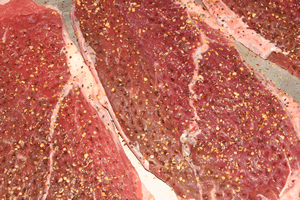 The objective of this review was to summarize selected health aspects of protein intake during the first 2 y of life. During this period there is a marked increase in protein intake from an intake of ∼5% of energy from protein (PE%) in an exclusively breastfed infant to ∼15 PE% when complementary foods have been introduced. At this age, mean protein intake is ∼3 times as high as the physiologic requirement, but some children receive 4-5 times their physiologic requirement. Protein from cow milk constitutes a main part of protein intake in toddlers and seems to have a specific effect on insulin-like growth factor I concentrations and growth. Meat has a high protein content, but the small amounts of meat needed to ensure good iron status have less impact on total protein intake. The difference in protein intake between breastfed and formula-fed infants is likely to play a role in the difference between breastfed and formula-fed infants. There is emerging evidence that high protein intake during the first 2 y of life is a risk factor for later development of overweight and obesity. It therefore seems prudent to avoid a high protein intake during the first 2 y of life. This could be accomplished by decreasing the upper allowable limit of the protein content of infant formulas for the first year of life and limiting the intake of cow milk in the second year of life.
The objective of this review was to summarize selected health aspects of protein intake during the first 2 y of life. During this period there is a marked increase in protein intake from an intake of ∼5% of energy from protein (PE%) in an exclusively breastfed infant to ∼15 PE% when complementary foods have been introduced. At this age, mean protein intake is ∼3 times as high as the physiologic requirement, but some children receive 4-5 times their physiologic requirement. Protein from cow milk constitutes a main part of protein intake in toddlers and seems to have a specific effect on insulin-like growth factor I concentrations and growth. Meat has a high protein content, but the small amounts of meat needed to ensure good iron status have less impact on total protein intake. The difference in protein intake between breastfed and formula-fed infants is likely to play a role in the difference between breastfed and formula-fed infants. There is emerging evidence that high protein intake during the first 2 y of life is a risk factor for later development of overweight and obesity. It therefore seems prudent to avoid a high protein intake during the first 2 y of life. This could be accomplished by decreasing the upper allowable limit of the protein content of infant formulas for the first year of life and limiting the intake of cow milk in the second year of life.


